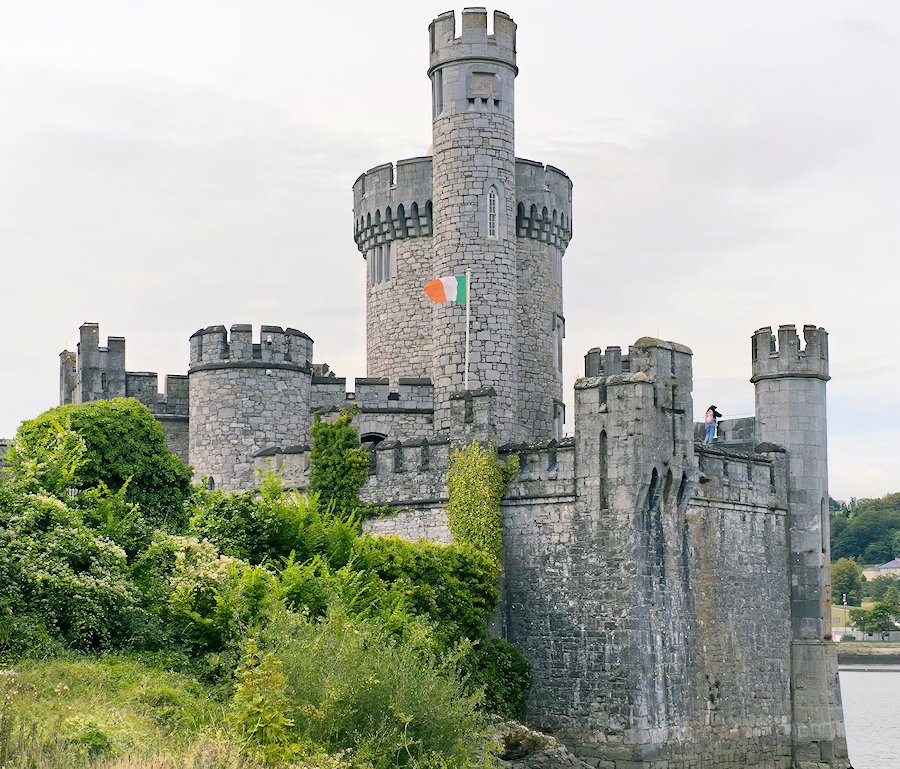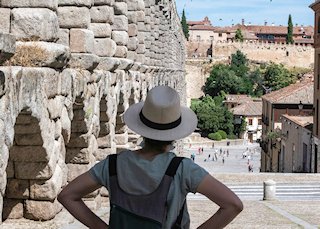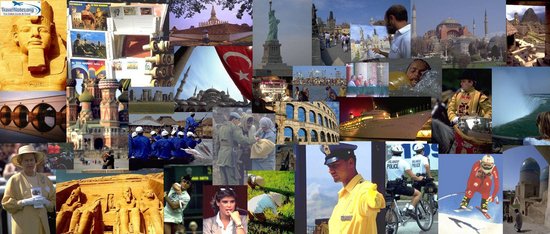Travel Notes: Destinations: Europe: Ireland - Cork Travel Guide > Cork Tours & Trips.
Short URL: https://tnot.es/ORK
Travel Guide For Visitors to Cork
Discover why Cork locals insist their city is the real capital of Ireland, and why you might just agree with them after visiting this charming southern emerald gem. Share on Facebook
Cork vs Dublin
Cork might be Ireland's second city, but it's got a serious case for main character energy.
Cork isn't Dublin's quieter sibling or a stepping stone to the Ring of Kerry, this spirited south-western gem has carved out its own identity as Ireland's cultural capital, food haven, and the place where locals will genuinely argue (with a straight face) that they're living in the 'real capital of Ireland'.
Driving Distances in Europe
 Add a Business -
Add a Location -
Add a Lodging - Add Travel Content
- Add URL
- Travel Services.
Add a Business -
Add a Location -
Add a Lodging - Add Travel Content
- Add URL
- Travel Services.
Cork - The Southern Rebel City That Swaggers
Cork doesn't just wear its 'Rebel City' nickname with pride; it practically swaggers with it.
This spirited southern Irish city has been quietly perfecting the art of authentic Irish living while Dublin gets all the tourist fuss.
From world-class food scenes that'll make your taste buds sing rebel songs to historic streets where every corner tells a story, Cork offers the genuine Irish experience without the crowds.
Whether you're planning a weekend break or using Cork as your base for exploring County Cork's dramatic coastline, this guide will help you navigate the city like a local; minus the strong opinions about hurling teams.
Getting Your Bearings - Cork's Layout Made Simple
Where Exactly Is Cork?
Cork sits pretty in Ireland's south-west, around 256km from Dublin and perfectly positioned for exploring the Wild Atlantic Way.
The city centre occupies an island in the River Lee, which explains why you'll find yourself crossing bridges more often than you'd expect in a relatively compact city.
The main shopping drag, Patrick Street, or 'Pana' to locals, curves through the heart of the city like a smile.
Most of what you'll want to see lies within easy walking distance of this central artery.
The city's hilly terrain means you'll get a proper workout exploring, but those climbs reward you with gorgeous views over the red-roofed cityscape and the Lee's gentle meanders.
Cork Airport and Getting Into Town
Cork Airport (ORK) is located around 6km south of Cork City centre, making it refreshingly manageable compared to other European airports.
The Bus Éireann 226A service runs every 30 minutes into the city centre (€2.50), or you can grab a taxi for around €25-30.
Cork Kent Station connects the city to Dublin (2.5 hours), with Irish Rail services running regularly throughout the day.
The station sits on the city's northside, about a 15-minute walk from the main shopping area.
Things to Do in Cork - Beyond the Blarney Stone
Cork City Gaol - History Without the Boring Bits
This restored 19th-century prison tells Cork's story through interactive exhibits that manage to be both educational and genuinely engaging.
The audio guide includes recordings from former inmates, adding authentic voices to the historical narrative.
Allow a couple of hours for the full experience.
The Shandon Bells Experience
St Anne's Church in Shandon allows visitors to climb the tower and ring the famous bells yourself.
It's touristy, yes, but also genuinely fun and offers brilliant city views.
University College Cork - Gothic Revival Glory
Even if you're not academically inclined, UCC's campus deserves a wander.
The Quadrangle showcases stunning Gothic Revival architecture, while the Glucksman Gallery hosts rotating contemporary art exhibitions.
The Cork Public Museum in Fitzgerald Park offers excellent local history exhibits without admission charges.
Where to Stay - Cork's Best Neighbourhoods
City Centre - Heart of the Action
Patrick Street and the surrounding pedestrianised area put you within stumbling distance of Cork's best pubs, restaurants, and cultural attractions.
The area buzzes with energy during the day and maintains a lively, but not overwhelming, atmosphere after dark.
Best for first-time visitors, nightlife enthusiasts, and car-free travellers.
The Metropole Hotel (Mac Curtain St) offers old-school charm with modern comfort, while The River Lee Hotel (Western Road) provides contemporary luxury with stunning views over the river.
Budget tip - Sheila's Hostel, on Belgrave Place, consistently ranks among Europe's best hostels: offering private rooms alongside dormitory accommodation.
Shandon - The Hipster Haven
Climb the hill to Shandon for a more residential feel while still being close to the action.
North of the river, this area has transformed from working-class neighbourhood to Cork's creative quarter; offering excellent value accommodation and genuine neighbourhood pubs where you'll rub shoulders with locals.
Best for budget-conscious travellers, and cultural immersion seekers.
Victorian Quarter - Historic Charm with Modern Comforts
The area around University College Cork oozes Victorian elegance and houses some of the city's most interesting guesthouses, with plenty of independent shops and cafés nearby.
Best for architecture lovers, romantic getaways, and photography enthusiasts.
Lancaster Lodge (Lancaster Quay, Western Road) combines boutique styling with walking distance to both the university and city centre.
Tourist Map of Cork
Use the Tourist Map of Cork to help you decide where to stay in Cork based on travel budget, preferred location, planned must-see attractions and local must-do activities.
Cork's Food Scene - Why Locals Are Quietly Smug
Cork's Restaurant Revolution
Restaurant Scene Highlights
Elbow Lane (4 Oliver Plunkett St) - Elevated pub food that understands the assignment.
Goldie (128 Oliver Plunkett St) - Fish and chips that'll ruin every other chipper for you.
Ichigo Ichie (5 Sheares St) - Cork's Michelin-starred Japanese restaurant that's genuinely earned its reputation.
The Cornstore (41-43, Cornmarket St) - Reliable fine dining in a beautifully converted Victorian warehouse.
Craft Beer and Traditional Pubs
Cork's pub culture extends far beyond Guinness.
The Franciscan Well Brewery (14 N Mall) combines excellent craft beer with a lovely beer garden, while the Mutton Lane Inn (3 St Patrick's St) claims to be Cork's oldest pub (whether this is true matters less than the atmosphere).
The Oval (25 S Main St) also offers an excellent selection of local and international beers.
The English Market - Ireland's Finest Food Hall
Forget Temple Bar's tourist traps, the English Market represents everything brilliant about Irish food culture.
Operating since 1788, this covered market showcases the best of local produce, from Gubbeen cheese to Clonakilty black pudding.
Don't Miss
Farmgate Café on the market's upper level serves exceptional lunch using ingredients from the stalls below.
The spiced beef sandwich is legendary among locals.
Day Trips from Cork - The County Beyond
Blarney Castle - The Tourist Trap Worth Visiting
Yes, 'Kissing the Blarney Stone' is somewhat ridiculous, but the castle and gardens genuinely deserve a visit.
Arrive early morning or late afternoon to avoid coach tour crowds.
Cobh - Titanic's Last Port
Cobh (pronounced "cove") served as the Titanic's final port of call and millions of Irish emigrants' last sight of home.
The Titanic Experience (20 Casement Squar) tells both stories with sensitivity and historical accuracy.
Getting There
Regular train services from Cork Kent Station take around half an hour.
Kinsale - Gourmet Capital
This picturesque harbour town, 25 kilometres south of Cork, is notable for its restaurants and artisan food producers.
Fishy Fishy (Crowleys Quay) remains the standout seafood restaurant, while the town's narrow streets reward aimless wandering.
Cork's Cultural Calendar - When to Visit
Summer Festivals (June-August)
Cork Midsummer Festival - International arts festival transforming the city each June.
Cork Folk Festival - Authentic traditional music celebration at the end of September or beginning of October.
Autumn and Winter Appeal
Cork's cultural venues hit their stride during cooler months.
The Everyman Theatre and Cork Opera House offer year-round programming, while the city's pub culture provides perfect refuge from Atlantic weather.
Getting Around Cork - Transport That Actually Works
Cork City Buses
Bus Éireann operates city services with day tickets offering unlimited travel.
The Real Time Passenger Information (RTPI) page provides live bus stop information.
Cycling Cork
Coca-Cola Zero Bikes provide bike-sharing across the city centre, while dedicated cycle lanes along the River Lee offer pleasant car-free routes.
Walking Cork City
Cork's compact city centre makes walking the obvious choice for most destinations.
The Grand Parade to Patrick Street pedestrian area forms the main thoroughfare, with most attractions within a 15-minute walk.
Cork Shopping - Beyond the Usual Suspects
Cork's Markets
Beyond the famous English Market, Saturday's Coal Quay Market offers vintage clothing, local crafts, and general browsing entertainment.
Patrick Street - The Main Event
Cork's primary shopping street mixes familiar chains with local independents.
Vibes & Scribes offers excellent books and stationery, while Plugd Records satisfies vinyl enthusiasts.
The Cornmarket Centre
This covered shopping area houses smaller independent retailers and makes for pleasant browsing during typical Irish weather.
Practical Cork - What You Need to Know
Cork Currency and Costs
Cork uses the Euro (€).
Expect restaurant mains from €15-25, pint prices around €5-6, and reasonable accommodation from €80-120 per night for decent quality.
Cork Safety and Local Etiquette
Cork ranks among Europe's safest cities.
Locals appreciate visitors who don't automatically assume everything's better in Dublin,
Cork genuinely offers different experiences.
Cork Weather Reality Check
Pack layers.
Cork's maritime climate means changeable conditions year-round.
Summer temperatures rarely exceed 20°C, while winter stays mild but wet.
Why Cork Deserves More Than a Day Trip
Cork's greatest strength lies in its authenticity.
This isn't a city playing to tourist expectations but a living, working place that happens to offer excellent food, culture, and craic.
Give it more than a rushed day trip, and you'll discover why locals are so fiercely proud of their 'real capital'.
Whether you're drawn by the food scene, the cultural offerings, or simply want to experience Irish city life beyond Dublin, Cork delivers without trying too hard.
And in a world of over-marketed destinations, that's genuinely refreshing.
More City Travel Guides
Cities in Africa - Cities in America - Cities in Asia - Cities in Australasia - Cities in Latin America - European Destinations - Middle East.
More From Travel Notes
Travel Notes Online Guide to Travel
Africa - Asia - Caribbean - Europe - Middle East - North America - Oceania - South America.
The Travel Notes Online Guide to Travel helps visitors plan their trip with country and city travel guides, local tourist information, reviewed web sites, and inspiring travel content.
Travel and Tourism Guides on Travel Notes
 If you find Travel Notes useful, please take a moment to
like us on Facebook and share with your friends on social media.
If you find Travel Notes useful, please take a moment to
like us on Facebook and share with your friends on social media.
Share on Facebook
Travel Resources
.
Travel & Tourism With Industry Professionals.

















